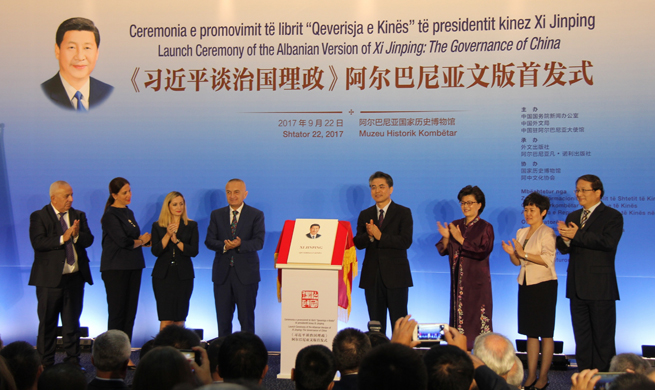By Ren Ke
BERLIN, Sept. 24 (Xinhua) -- Although the far-right Alternative fuer Deutschland (AfD) has for the first time been elected into the German parliament on Sunday, experts believed that the party puts limited threat to established system and its influence in the future is restricted.
As expected as the pre-election polling results, preliminary exit poll showed the AfD got 13.5 percent of votes in the German federal election, crossing the 5-percent-vote hurdle and making it the first far-right party in the Bundestag, or the Federal Parliament, since World War II.
It has also become the third largest party in the Bundestag following Angela Merkel's CDU/CSU bloc and the Social Democratic Party (SPD).
Founded in 2013 and winning 4.7 percent votes in the last German federal election, the AfD gained momentum during the euro crisis and the refugee crisis. After an intra-party struggle in 2015, it shifted farther right from a conservative party focusing on economic issues to a far-right national conservative populist one.
But many experts believed that the party's influence should not be overestimated.
Prof. Dr. Paul Nolte, a historian with Free University Berlin, said as SPD said they will not form another grand coalition government with the CDU/CSU bloc, the AfD will not become the largest opposition party, so that their influence in the Bundestag will be restricted.
Prof. Dr. Hajo Funke, a political scientist with Free University Berlin focusing on right-wing extremism, told Xinhua that although the AfD is popular to a small degree in the public, but most others have realized that it is a dangerous right-wing party.
Although it has entered the Bundestag, none of the parties in the federal parliament, no matter the small parties or the country's two major parties, ruled out cooperation with the AfD in any form, possibly making it a lonely marginal man in the Bundestag.
Funke also doubted that the AfD would be stronger in the future, as the party has lost the flexibility.
"Right-wing parties like the FPOE in Austria, they say something very radical but act more like centrists. But when it comes to AfD, its leading structure has decided to be right-wing radical, which has limited their influence," said Funke.
AfD leaders always draw fierce criticisms with their radical remarks that often cross the bottom lines of German politics. In his election campaign, Alexander Gauland, one of the party's two candidates, said Germans should be proud of the "achievements" that German soldiers made in the two world wars.
The remark followed his racist one saying that Aydan Oezoguz, German government's commissioner for integration with Turkish origin, should be "disposed of" in Turkey, drawing wide accusations by most of German leading politicians.
"People can protest against refugee or Euro crises, but they will not need a party which will endanger a stable democracy," according to Funke.
Nolte told Xinhua that the AfD's popularity may imply a return of far-right populism in Germany, but only to a very limited degree compared to other countries.
As the United States, the populist Donald Trump was elected president and in France the far-right populist Front National led by Marine Le Pen won 20 to 30 percent support, Nolte believed that in this sense German politics have become more "normal" in the western pattern of politics.
Observers believed that in a time with great challenges and doubts about the previous courses of major projects like European integration, and a lot of social uncertainty and insecurity of future, populism has its deep-seated roots that need politicians and the whole society to address.
Furthermore, it will find that the party politics is totally different from election campaign events, which will be a challenge for the AfD. And according to their roles in some state parliaments, AfD deputies were not strong to political initiatives or working in committees, so that the party will not make any immediate impacts in the bundestag.
The AfD has also raised concerns in a country that far-right populism often reminds people of the Nazi history that had brought great miseries over seven decades ago. However, experts believed that such association was totally wrong.
"The current Germany is not the Weimar Republic, nor the AfD is the Nazi," said Nolte. "Germany is a stable democracy focusing on centrist and middle. There is no possibility to repeat the history at all."
Due to its historical lessens, Germany is always vigilant against far-rightness, outlawing words and deeds involving racism, discrimination and beautification of war crimes, a concept called by some political scientists as defensive democracy.
As such concept has been widely recognized by the majority of the people, experts believed that far-right populism will be tightly restricted in Germany, and chaos in other counties, like the Charlottesville conflict in the United States, will not take place here.
However, the social problems reflected in the rise of the AfD will also need to be addressed, as Merkel promised in her speech following Sunday's election that her government will try to win back voters of the AfD with good policies.
According to Funke, the new German government needs to address the social injustice, better integrate immigrants into society, reorganize Germany's borders, and address the causes of refugee crisis, especially in Africa.
And when those issues are solved, the AfD and populism behind it will go down, said Funke with optimism.

















